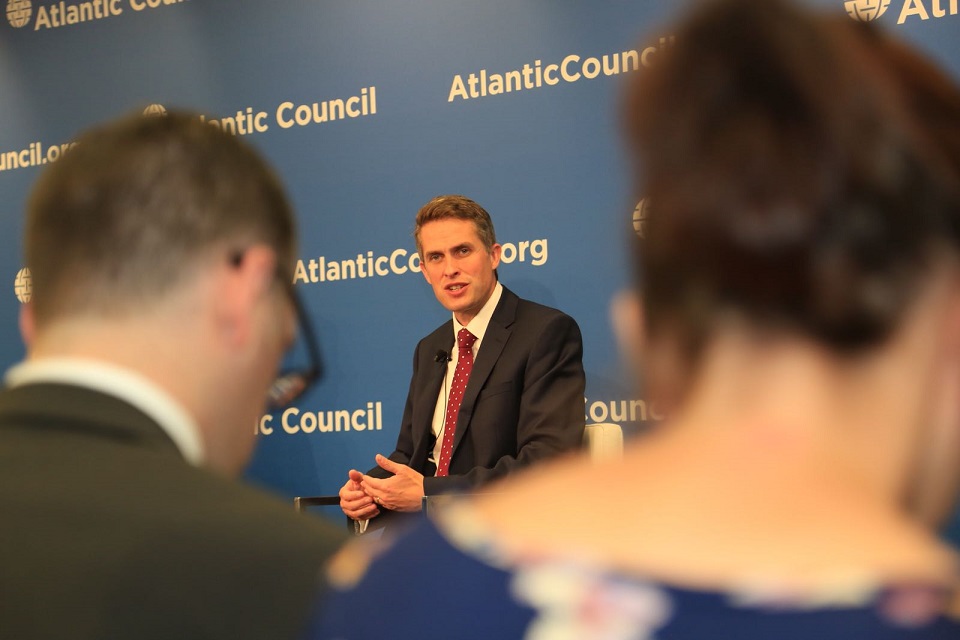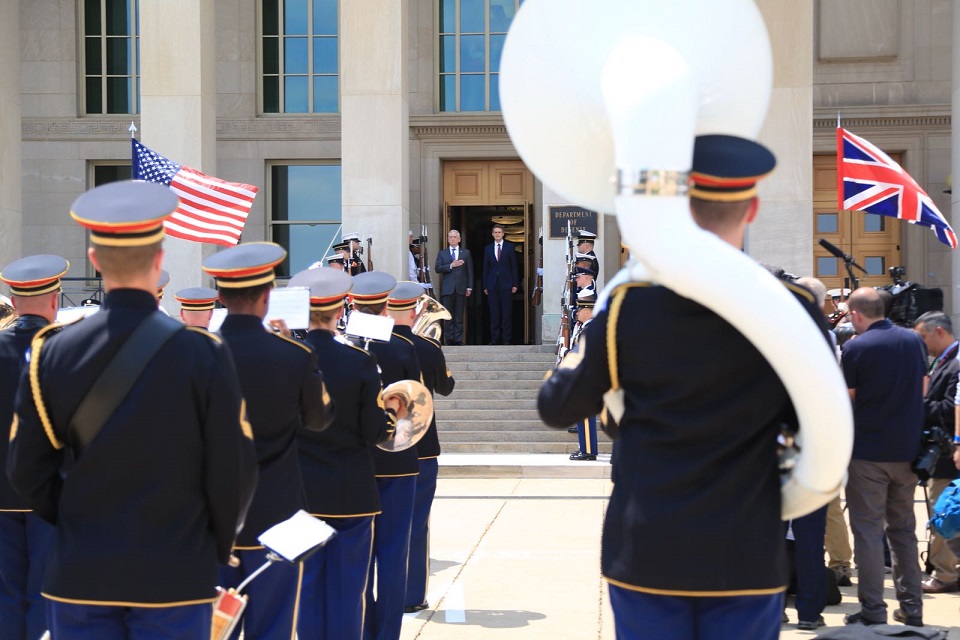Introduction
Thank you for that kind introduction, Mark [Roberts].
I am delighted to welcome you to the First Defence Space Conference, jointly organised by the Air Power Association and the Ministry of Defence.
I’d like to start with an invitation:
Look west at about ten to nine tonight.
If it’s clear … and if you’ve got very good eyes … you might just make out a small point of light, making its way steadily across the evening sky.
500 miles up, heading south over the mid-Atlantic, is the satellite Prospero.
Built by British craftsmen at the Royal Aircraft Establishment in Farnborough …
… launched by a British Black Arrow rocket back in 1971 …
… its systems de-activated and its radio signals not heard for nearly 15 years …
… but still up there, gamely orbiting the earth every hour and a half at 17,000 miles an hour.
A museum piece? A time capsule? Just an anonymous piece of space debris from the age of Apollo?
No. I see Prospero as an inspiration – not just reminding us of this country’s space heritage, but pointing the way to a bright future.
Conference Overview
We have a proud tradition of expertise and innovation in space technology.
Our space community may be small in number, but it is perfectly-formed and exceptionally well-connected.
I am very pleased to see so many of you here today.
Today’s Conference will highlight why and how we are strengthening our approach to space capabilities and operations.
And we’ll be stressing the centrality of our partnerships with the UK Space Agency, with our international allies, and with the industry.
Because as space technology takes an ever more central place in all our lives and activities, it becomes increasingly important to Defence and Security.
At the same time, we face new hazards … new threats to civil and military satellites, and other vital space services.
I’d like to look at those areas in turn.
Military Importance of Space
The first thing to bear in mind is that space isn’t just about what happens above the stratosphere.
It’s about what happens down here.
We rely on space capabilities and services for very many of our Defence functions.
They provide critical intelligence, surveillance and reconnaissance, precision navigation, and timing.
Without them, our Armed Forces’ co-ordination and communication would be much more difficult.
In some circumstances, it might be impossible.
So over the last year we’ve expanded our thinking at MOD.
Advanced space capability is essential to support all Defence environments.
That’s why we designated it as a Critical National Infrastructure in 2015.
And why space has joined air, land, sea and cyber to form the five domains which now inform all UK Joint Force policy.
Commercial Importance
Of course, space is also a vital part of the economy – an industry worth £14 billion a year.
We build a quarter of the world’s large communications satellites.
Our expertise in smaller satellites is unrivalled, with the likes of Surrey Satellites, Clyde Space, and Oxford Space Systems building about 40% of the global total.
We’re also leading the world in wider space technology.
Reaction Engines, for example, are unlocking the future of hypersonic flight with the revolutionary Sabre propulsion system.
And the UK’s Daedalus experiment – which we’re helping to fund via the Chief Scientific Advisor’s investment into the Defence Science and Technology Laboratory – is pushing the boundaries of what’s possible in space sustainability.
Daedalus is exploring “de-orbit sails”, giving satellites a controlled descent into the Earth’s atmosphere at the end of their operational lives.
The pace of change in affordable space technologies is quickening … and we have to harness that for Defence.
Threats
So we’ve got a thriving space sector, at the cutting edge of a technology which is becoming more central to progress and prosperity with every passing day.
But that technology is potentially very vulnerable.
The UK remains fully committed to the 1967 Outer Space Treaty, which declares space to be the province of all mankind – free for exploration and use by all nations.
While that’s a noble sentiment, we have to recognise that the world has moved on.
Back then, beaming a flickering TV picture across the Atlantic was a rare event – a marvel.
Now space-based technology is everywhere, underpinning many aspects of our daily life.
If it were seriously compromised, it wouldn’t just affect the military.
We all rely on satellites for communications, navigation, and meteorology.
That means everything from your daily weather forecast or the SatNav in your car … to the emergency services’ ability to respond when we most need them.
We’d all experience delays, shortages and bottlenecks … enormous social and economic damage could be possible.
What’s more, our ability to monitor and react to threats would suffer … severely affecting our ability to react to humanitarian crises, weather events, terrorist attacks, breaches of arms control agreements or expanding drug cultivation.
At the same time, the threat environment is very different.
The era of the Treaty was the era of Gemini, Vostok and the bipolar Cold War.
Things are more complicated now.
The international environment is more fluid … rogue states are more ready to challenge the rules-based international order … and non-state actors are increasingly gaining access to the sort of high tech equipment which was once the monopoly of NATO and the Warsaw Pact.
Space is becoming much more accessible, with cheaper satellites put into orbit by commercial suppliers using greatly improved launch technology.
But at the same time, space is a more threatening environment.
Back in 2007, China tested a satellite killer.
Not only did that show the physical vulnerability of our space hardware to attack …
… it sent thousands of pieces of debris spinning through the orbital environment, endangering billions of pounds of equipment from many countries, including the International Space Station.
The danger also comes from cyber hackers … and those who seek to disrupt the satellite signals we depend on with cheap devices bought on the internet.
We are responding in a comprehensive and deliberate manner.
As I mentioned, we are now treating space as a key operational domain.
We’re working to fully understand the risks – from accidents and natural hazards in space, to a deliberate attack by organised groups or another state.
We must be able and willing protect and defend our space assets and infrastructure alongside our allies and partners.
And we’re actively looking at our own space capability and the scope for new international partnerships, as we approach Brexit in March 2019.
Our Approach
To stay ahead in the space race, we’re taking a three-fold approach.
Partnership
First it’s about partnership – internationally, at home and across Government, and with the private sector.
All our key allies are seeking to develop their space thinking and investment, and many are increasing their investment in defence and civil space programmes.
We are actively working through NATO to raise the profile of space technology in Defence and Security, and ensuring we’re at the forefront of international space Science &Technology activities.
At home, our close co-operation with the UK Space Agency and the industry is vital.
Graham Turnock will be speaking to you later.
While I won’t steal his thunder, I will mention their excellent work towards a Civil Space Strategy, ensuring that the UK remains at the forefront of the latest space developments worldwide.
When it comes to partnership, I should add that we’re keen to remain a part of the Galileo project in which we were instrumental from the start.
The threats that Galileo is designed to counter are shared by all of Europe.
So it makes no sense for the Commission to exclude us from this programme – especially when many of its key modules and software were developed and built by UK experts.
By denying us the level of participation in Galileo we need to meet our mutual security requirements – which is well beyond simply having permission to use the secure signal – the Commission risk setting the programme back a number of years.
It would no doubt also increase its cost.
We don’t want that to happen.
We want to work closely with our European partners on security, so we’re still in discussion about the programme’s future.
But we’re also making sure we’re not limiting our own opportunities.
That includes looking at the possibility of an independent encrypted satellite navigation service, and the MOD is strongly supporting the Task Force led by the UK Space Agency, to look at the alternatives.
Investment
The second pillar of our approach is investment in technology and skills.
As Greg Clark announced last November, the Government is putting £50 million into the development of spaceports under the UKSA’s LaunchUK programme …
… accessing a global market for launching small satellites worth £10 billion over the next decade.
£99 million has been awarded to RAL Space from the Government’s Industrial Strategy Challenge Fund to develop the National Satellite Test Facility.
By 2020, that will provide a world class set of facilities for the assembly, integration and testing of space payloads including a large satellite test chamber.
This will enable UK companies to develop “next generation” launch and testing technologies for constructing satellites and delivering payloads into orbit …
… as well as giving them the tools to bid competitively for international contracts, ensuring the UK remains a world-leader in the space technologies market for decades to come.
£10 million has gone into PRIMUS to develop a small satellite constellation.
And the Government has put £.4.5 million into the launch and operation of Surrey Satellites’s Carbonite-2, which has given our military access to sovereign full-motion colour video from space for the first time.
This is serious investment.
MOD Space Strategy
We know this is a huge market – and it’s getting bigger by the day as new applications of technology find new commercial uses.
In addition, the United States and other nations are now actively looking for commercial space partners.
And that brings me to the third part of our approach – seizing opportunity.
With its heritage and expertise, the UK’s industry is well placed to grow rapidly.
Our aim is to grow the UK’s share of the global space market from 6.5% to 10% … generating £40 billion a year for by 2030.
So we’re determined to fire up the thrusters for military space capability by publishing our first ever Defence Space Strategy in the summer.
The 2016 Queen’s Speech committed the Government to making space a priority.
As I’ve shown you, we’re now delivering on that commitment through investment and partnership, uniting experts from across government and the private sector.
The Strategy will bring that work together as a vision for the future, and other speakers today and tomorrow will say more about the key elements of it.
And we’re opening up the enticing prospect of Britain regaining the ability to launch satellites into orbit – something I know is close to many of your hearts.
Conclusion
On that note, I’d like to leave you with a final thought.
Earlier I mentioned Prospero – the last satellite launched by the UK …
… a successful venture whose results can still be seen in the night sky, nearly half a century later.
That was what we could do back then.
Today we not only have enormous technical nous – we have strong bonds with partner nations across the world.
What could we do tomorrow?
In a few decades’ time, I don’t doubt they’ll be many more sparkling points of light in the night sky …
… to which we can proudly point and say “Made in Britain”.
Thank you.

